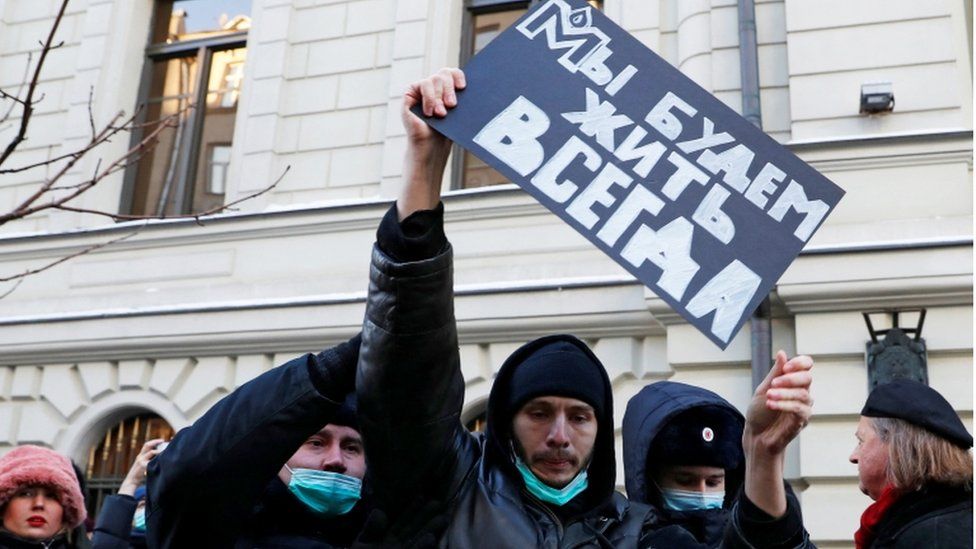Vladimir Putin Redeeming the Glory of the USSR
Vladimir Putin Redeeming the Glory of the USSR
"Memorial is a special organization with its own ideology. We combine what's called relevant human rights activities with historical studies and comprehending the historical path of Russia in the 20th century.""It seems that such a union does not please someone in the Russian leadership."Oleg Orlov, Memorial board member"The decision ...confirmed that the history of political terror ... does not remain an academic theme for Russia of interest for just specialists but an acute problem for modern Russia.""Our country needs an honest and scrupulous reflection on its Soviet past.""Memorial is the need for Russia's citizens to know the truth. Nobody will succeed in 'liquidating' this need."Memorial statement
 |
| Supporters hold placards saying "we will live forever" with Memorial's flame symbol above the Russian word "we" Reuters |
The
Supreme Court of Russia has found the country's most seasoned human
rights group, Memorial International, to have offended the country's
dignity and pride in its past. The group has been ordered to disband.
Critics within Russia of the Kremlin, of its policies, of its crackdown
on dissenting voices, and above all, of its president-for-life, disturb
the peace and serenity that Moscow enjoys in the capable hands of its
new czar who aspires to return Russia to its former glory days.
The
order for Memorial International to cease and desist, to fold up and be
no more, more or less caps a few successful years of silencing and
setting aside critics of the regime. As explained by Moscow, it owes the
nation protection from those involved in extremism, who plan to do harm
and destabilize Russia, with the considerable encouragement, incitement
to violence, and funding from abroad. Clearly, foreign agencies are at
the heart of nefarious plots to unseat the government and the Kremlin
will not stand for it.
Memorial's
mission is to document and to remind the nation of what Josef Stalin
wrought in his "Great Terror", when those inconvenient to and critical
of his brutal regime were sacrificed to the altar of Communism. The mass
killings of intellectuals, Bolshevik officials, political officials,
members of the military, writers, ethnic minorities, scientists,
writers, foreigners and peasant land-owners. Along with any other groups
Stalin conceived of as saboteurs.
The
number of dead during the great purge has been variously estimated to
be between three-quarters of a million, to two million people, while
political prisoners numbered around a million, sent to the Gulags, as
Stalin's reign consolidated its position by eliminating challengers and
suspected challengers. Since Vladimir Putin ascended to power and
changed the constitution to allow him to reign in perpetuity, he has
imprisoned critics, assassinated others, a silencing mechanism hugely
relied upon for its finality, however clumsily undertaken.
He
has banned political groups critical of his administration, and
imprisoned their leaders on implausible charges. He has taken to
emulating Stalin's purges to silence his critics. And he seems
determined to restore the reputation of the USSR as a force for good,
both for Russia and for its satellite states. Memorial was established
during the period of 'glasnost' introduced to Russia by then-president
Mikhail Gorbachev, determined to modernize Russia and move it away from a
closed state.
Addressing
the court, a state prosecutor stated that Memorial had promoted a
'false image' of the USSR as 'a terrorist state', besmirching its proud
memory during the Second World War. "Someone" was paying Memorial for
such treachery, he averred. Subsequently, Memorial was found to have
broken a controversial law on foreign agents by repeatedly failing to
use a disclaimer in its materials and its website relating to receiving
foreign funds.
This,
despite that Memorial is quite openly frank that it receives funding
from abroad, where its website lists funding from Poland, Germany,
Canada and the Czech Republic. The U.S. ambassador to Russia, John
Sullivan, spoke of the court order as "a blatant and tragic attempt to suppress freedom of expression and erase history". Memorial had been co-established by nuclear physicist and Nobel laureate Andrei Sakharov.
It
had recently challenged the repression of critics, publishing lists of
people it considers to be political prisoners. In 2015, Russian
authorities had placed Memorial on an official list of "foreign agents",
burdening it with restrictions on its activities. The Memorial Human
Rights Centre and Memorial International were accused of violating the
foreign agent law.
Memorial
International, according to prosecutors, breached regulations through
failing to mark all its publications, including posts on social media
with the distinguishing label. They also accused the group of condoning
terrorism and extremism. According to President Putin, Memorial had
defended organizations that Russia labels extremist and terrorist; its
list of victims of Soviet-era repression included Nazi collaborators.
Labels: Critics, Memorial International, Repression, Russia Vladimir Putin

<< Home